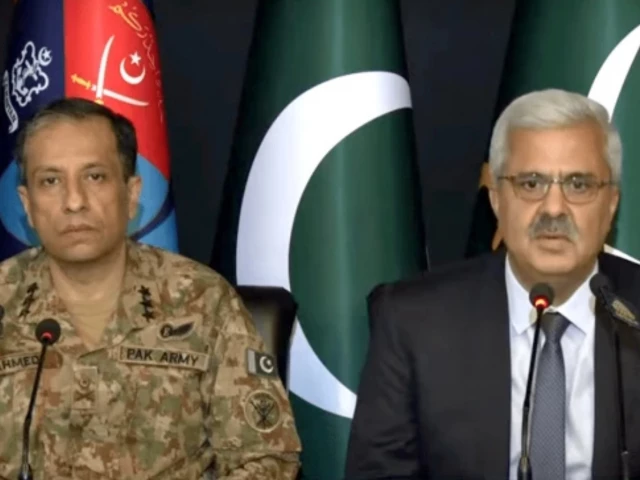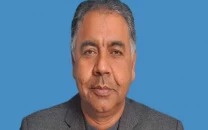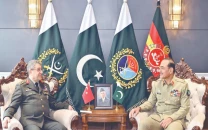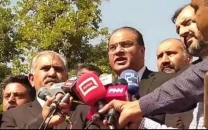Should govt decide, prep complete for Zarb-e-Azb-style operation in Balochistan: official
Fitna al-Hindustan has been waging terrorism in Pakistan for over two decades: DG ISPR

In the aftermath of a suicide attack on a school bus in Khuzdar on Wednesday, the interior secretary stressed that Pakistan remains fully committed to combating terrorism and could launch an operation similar to Zarb-e-Azb.
The barbaric attack claimed the lives of at least eight people, including six children.
Interior Secretary Captain (retd) Khurram Agha shared that, according to initial investigations, 'Fitna al-Hindustan' was behind it, indicating a shift from hard targets to soft targets, condemning the “cowardly attack on innocent lives” and vowing retaliation.
During a joint press briefing with DG ISPR Lt Gen Ahmed Sharif Chaudhry in Rawalpindi on Friday, he recalled that after the tragic 2016 Army Public School attack in Peshawar, Operation Zarb-e-Azb significantly reduced terrorism statistics.
Addressing the possibility of future large-scale operations, he remarked, “If need be, and that would be a later decision, there would be an operation maybe similar to Zarb-e-Azb.” He maintained that the government is already actively engaged in continuous counterterrorism operations.
“As of now, there are continuous operations underway that you [media] are witnessing and Lt Gen has shared figures relating to those as well.” He added that the attack was not just on a school bus, but an attack on our values, education, and the fabric of our society. “Our response will be decisive. They will not succeed,” said the interior secretary.
DG ISPR said that India-sponsored attackers have no humanity, morality, and Baloch or Pakistani identity, adding that India has been involved in state-sponsored terrorism for 20 years, destabilising regional peace. He pointed out that in 2009, Pakistan had presented a dossier to the United Nations with evidence of India’s involvement in terrorist activities in Balochistan.
He further mentioned that in 2016, Pakistan had again provided evidence of Indian involvement in terrorism to the UN, and that arrested terrorists had admitted to receiving funding from India for various attacks. He stressed that the Khuzdar incident was deeply tragic, carried out under India’s orders, and that Fitna al-Hindustan is targeting innocent people, including children and travellers.
The military spokesperson recalled past terrorist incidents in Balochistan such as the killing of workers, attacks on buses, bombings, and incidents involving non-locals being targeted in barber shops. He detailed a string of attacks carried out under Indian direction in Balochistan, including:
-
12 labourers killed in Nushki on April 12
-
Two civilians killed in Tump Kech on April 28
-
10 killed in an IED blast in Harnai on February 14
-
Three people martyred in Lasbela on May 9
-
Off-duty personnel targeted in the Jaffer Express incident
He said the attack on Khuzdar was an escalation in this pattern, with India shifting its strategy to attacking women and children. Images and video footage of the slain children were also shown during the briefing.
He clarified that Fitna al-Hindustan was behind these attacks, with India's support, as corroborated by the confessions of convicted terrorists. He added that the terror activities in Balochistan were not linked to any specific ethnic group or religion but were the result of India’s proxy war in the region.
DG ISPR also presented an audio recording of an Indian army officer, Major Sandeep, discussing the funding for terrorism in Balochistan. The officer's conversation revealed how India strategically sent money to further terrorism in Pakistan, using separate accounts for different stages of operations.
He raised questions about India’s justification for attacking Pakistani mosques and madrasas. He questioned the credibility of India’s claims, pointing out that Pakistan has always presented evidence to counter India's allegations, whereas India has failed to provide any proof of its own.
Read: UN Security Council condemns Khuzdar school bus attack
The conference also included images of terrorists killed by Pakistani security forces in Balochistan, showing them armed with expensive foreign weapons like sniper rifles and night-vision equipment. Lt Gen Chaudhry questioned who provided such advanced weapons to these terrorists, pointing to India as a key financier of these operations.
He added that on October 6, 2024, an attack on Chinese nationals was reported, followed by rapid coverage in Indian media, which shows how Indian media is complicit in such events. He criticised the Indian media for celebrating the deaths of Pakistani women and children and for falsely accusing Pakistan of being the source of terrorism.
In response to questions, DG ISPR further said that Pakistan has been steadily curbing terrorism, as evidenced by the elimination of more than 200 terrorists in Balochistan in the current year alone. Last year, close to 250 terrorists were killed, he said, adding that Pakistan is effectively closing illegal trade routes that fund terrorism, and the local population is supporting the efforts of the Pakistani forces.
Lt General Chaudhry explained that India’s proxy terrorism is creating a situation where the Pakistani military is compelled to take action. He pointed out that while India continues to rely on its proxies to create instability, Pakistan remains united, with the military, government, and public all aligned in fighting terrorism.
Also read: Pakistan's military dismisses Indian water threat as ‘insane thinking’
He also highlighted the development projects in Balochistan, including investments in the blue economy, the Gwadar International Airport, and the ongoing construction of roads, hospitals, and technical institutes, signalling the province’s future growth.
DG ISPR emphasised that Balochistan’s growing prosperity is a challenge for terrorists, as it shows the strength of Pakistan's unity and the growing opportunities for its people, including over 73,000 Baloch students receiving scholarships.
He reiterated that terrorism in the region was fuelled by India’s desire to dominate and destabilise the region, especially through proxy groups. He maintained that Pakistan’s strategy remains focused on intelligence-based operations to eliminate terrorism while minimising the impact on the civilian population.
In conclusion, DG ISPR addressed the need for Indian recognition of the reality of Pakistan’s resolve to protect its sovereignty, emphasising that the Kashmir dispute remains a core issue for peace in the region. He also reiterated that the country’s water rights under the Indus Waters Treaty would not be compromised, and Pakistan would continue to defend its territory and rights with resolve.
Read more: Army top brass vows to decimate terror proxies, facilitators
A day earlier, the top military commanders declared that "no one can coerce Pakistan through the use or threat of force" and that the hostile elements trained and financed to incite chaos in the country will be decimated.
The declaration was made at the 270th corps commanders' conference chaired by Army chief Field Marshal Syed Asim Munir at the GHQ in Rawalpindi, according to a statement issued by the military's media wing, the ISPR.
The ISPR stated that the forum reaffirmed "Pakistan's unyielding resolve" to defend its sovereignty and territorial integrity against any act of aggression or misadventure.
The corps commanders, while reiterating Pakistan's strategic stance, declared: "No one can coerce Pakistan through the use or threat of force. The nation will take all measures necessary to safeguard its vital interests."
























COMMENTS (3)
Comments are moderated and generally will be posted if they are on-topic and not abusive.
For more information, please see our Comments FAQ